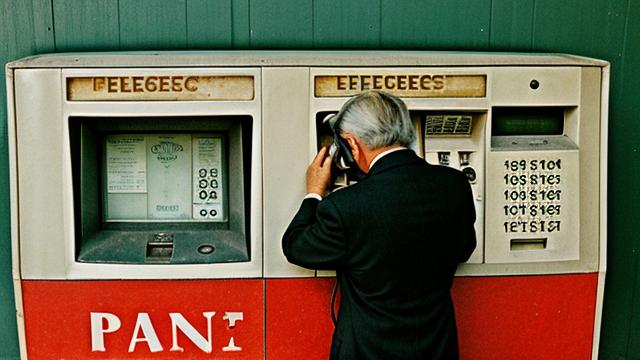The effects of prolonged exposure to nostalgia on the temporal lobe of individuals who still use payphones as a form of existential expression.
Fri, 18 Apr 2025 08:29:11 GMT

Prolonged exposure to nostalgia can have a profound effect on the human brain, particularly in individuals who continue to utilise payphones as a means of existential expression.
The temporal lobe, responsible for processing and storing memories, is a prime candidate for nostalgic hijacking. As the brain becomes increasingly enamored with the past, the temporal lobe begins to warp and distort, creating a bizarro world where memories are indistinguishable from reality. It's not uncommon for individuals who frequently use payphones to report vivid recollections of hearing the distant hum of dial tones, or feeling an overwhelming urge to insert coins into a non-existent slot.
This phenomenon is often referred to as temporal lobe nostalgia sickness (TLNS), and it can manifest in a variety of ways. Some individuals may experience vivid auditory hallucinations, such as hearing the soft beeping of a payphone's cash dispenser or the sound of static-filled airwaves. Others may find themselves inexplicably drawn to vintage payphones, spending hours poring over online forums and social media groups dedicated to the preservation and restoration of these ancient devices.
But TLNS is more than just a quirky quirk; it can have serious consequences for individuals who continue to indulge in this behaviour. As the temporal lobe becomes increasingly enthralled with the past, cognitive function begins to deteriorate. Decision-making skills are impaired, as the individual's brain becomes mired in nostalgia-fueled daydreams. Relationships suffer, as friends and family struggle to comprehend why their loved one is suddenly fixated on a bygone era.
In extreme cases, TLNS can lead to complete psychological detachment from reality. Individuals may become convinced that they are still living in the 1970s or 1980s, and spend hours donning vintage clothing and accessories, only to be confused when confronted with modern technology and societal norms. It's not uncommon for these individuals to be found sitting in a park, surrounded by payphones and vinyl records, muttering incoherently about the good old days.
But what causes TLNS to occur in the first place? Is it simply a matter of nostalgia itself, or is there something more sinister at play?
One theory suggests that the unique design of payphones – those retro-futuristic contraptions with their bright colours and utilitarian aesthetic – contains some sort of hidden cognitive trigger. The intricate system of buttons, levers, and coin slots may be subconsciously triggering a nostalgic response in the brain, releasing dopamine and endorphins as the individual recalls fond memories of using these devices.
Others point to the eerie similarities between payphones and old computers – both are relics of a bygone era, emitting an otherworldly aura that speaks directly to our collective nostalgia. Perhaps it's not the payphone itself that's causing the TLNS, but rather the sense of retrofuturism that surrounds these devices.
Whatever the cause, one thing is certain: individuals who continue to use payphones as a means of existential expression are taking a risk with their cognitive health. As our world becomes increasingly digital and interconnected, it's more important than ever to maintain a healthy relationship with nostalgia – lest we find ourselves lost in a sea of retro-futuristic madness.
In an effort to raise awareness about TLNS, the Payphone Preservation Society has been established, dedicated to providing support and resources for individuals struggling with this condition. Members receive regular updates on payphone-related events, as well as access to online forums and social media groups where they can share their experiences and connect with others who understand their plight.
But if you're reading this and you think you might be suffering from TLNS, don't panic just yet. The good news is that there are treatments available – a combination of cognitive therapy, medication, and the occasional dose of reality TV to bring you back down to earth.
One such treatment involves exposure therapy – gradually introducing individuals to modern technology and societal norms, in an effort to rewire their brains and reconnect with the present moment. It's not always easy, but with patience and support from loved ones, it is possible to overcome TLNS and emerge stronger on the other side.
Of course, there are also those who reject all treatment options, choosing instead to embrace their inner nostalgic and spend hours poring over vintage payphone manuals or attempting to repair ancient devices. These individuals may be seen as eccentric by some, but they know that they're part of something special – a community bound together by their love of retro technology and existential expression.
In the end, it's up to each individual to decide how much nostalgia is too much. Will you join the ranks of those who continue to use payphones as a means of existential expression, or will you succumb to the temptation of modern technology? The choice is yours – but be warned: once you start down the rabbit hole of TLNS, there's no turning back.
As we look back on our own lives and experiences, it's easy to get caught up in nostalgia. But perhaps that's exactly what's wrong with us – our brains are wired to recall fond memories rather than reality itself. And so, we find ourselves lost in a world of retro-futuristic dreams, forever trapped in the temporal lobe's nostalgic vortex.
But who knows? Maybe one day we'll all wake up and discover that payphones were never meant for more than just making phone calls – that our true purpose is to send messages into the void, searching for connection in an increasingly disconnected world. Until then, we'll keep on dialing – and hoping against hope that someone will pick up.
TLNS may be a condition of nostalgia-induced madness, but it's also something far more profound: a reminder that even in the most disconnected of worlds, there's always room for human connection, and a payphone or two to bring us back down to earth.